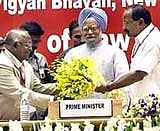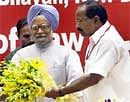

Addressing a joint conference of chief ministers and chief justices of the high courts here, Singh laid stress on ensuring that “the enormous global respect for the Indian judiciary for its path-breaking doctrines and consistent independence be soon matched by similar accolades for an arrear free judicial institution.”
As far as the pendency of the huge number of cases in courts was concerned, Supreme Court Chief Justice K G Balakrishnan was in agreement with the Prime Minister. The conference was not jarred by the recent controversy over the judges assets bill.
The Prime Minister announced the Union Government’s decision to set up 71 additional CBI courts in different states. But Singh made it a point to say that his government would match each step of the judiciary with two of its own in the war on arrears.
“The government is in agreement with the CJI that an attitude of taking firm, independent and impartial decisions, if adopted by the government, would itself lead to a substantial reduction of arrears and would definitely control the inflow of litigation into the courts of justice,” Law Minister Veerappa Moily said, adding that the government intended to develop a national litigation policy.
Singh also aired concerns over the huge number of vacancies in the high courts and subordinate courts as well as the large number of under-trials in the jails.
At the conference, dominated by the huge backlog of litigations, Justice Balakrishnan said that over 3.11 crore cases were pending in trial courts and high courts across the country. He said that 52,592 cases were pending before the Supreme Court, over 40 lakh cases in the high courts and a whopping 2.71 crore cases in the subordinate courts.
In his inaugural speech the Prime Minister said that the Indian judiciary, despite its strengths, brilliance and dynamism, had to “suffer the scourge of having the world’s largest backlog of cases and timelines that generate surprise globally and concern at home.
“The expeditious elimination of this scourge is the biggest challenge for such conferences and should constitute the highest priority for all of us,” he said emphatically.
Singh suggested that the entire legal system and each rung of it would have to function as a seamless web and an indivisible whole in the “war on arrears”, with the apex court discharging the vital roles of “a catalyst, an organiser, a mentor, an umpire, a participant, and, above all, a role model, all at the same time.”
He termed as “very disturbing” the fact that many under-trials were lodged in jails for periods longer than they would have served had they been sentenced. His concerns were echoed by Moily and Justice Balakrishnan, who later said that 70 per cent of prisoners in the jails were under-trials.
A suggestion was mooted in the conference that if chief judicial magistrates, especially in the cities, found that any under-trial was serving more than the punishment stipulated by the law, he or she should be set free.